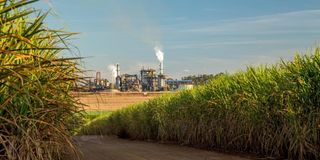Sugar cane farmers to reap big from firm’s investment

A view of Kwale International Sugar Company.
Investment in modern technology by Kwale International Sugar Company (Kiscol) has revitalised sugar cane farming in the coastal region, bringing new hope to over 1,500 outgrowers.
The move has extended the coast-based miller’s sugar cane crushing season from six to nine months annually, a development lauded by farmers and industry stakeholders.
According to the chairman of Kwale Sugarcane Outgrowers Association David Ndirangu, advanced irrigation systems have improved their production window and reduced reliance on rain-fed agriculture.
Additionally, the miller recently announced the introduction of new sugar cane varieties sourced from Australia, Brazil and South America to significantly improve the yield for farmers who rely on the cash crop.
In a recent statement, Kiscol also unveiled plans to increase its crushing operations to 11 months next year in a bid to boost the supply of sugar cane.
“With more months of crushing, I know our harvests will be processed and we will have a steady market for our cane,” Mr Ndirangu told the Nation.
Kiscol’s nucleus farms are equipped with extensive drip irrigation systems, ensuring faster maturity and a continuous supply of cane throughout the year.
Since commencing operations, the Mauritius-owned company has expanded its land under cane from 6,300 hectares to 9,477 hectares as of last year, with its nucleus estate growing from 3,710 hectares in 2015 to 4,791 hectares by the end of last year.

A section of Kwale Sugar nucleus farm.
Mr Ndirangu also noted that outgrowers have increased their land under sugar cane from 2,682 hectares three years ago to 4,686 hectares last year.
This revitalisation follows a recent agreement with the government to compensate squatters, allowing for the cultivation of previously underutilised land.
“The recent Mashujaa Day decision to settle the squatters by the government shows its commitment to enhance food security in the region,” Mr Ndirangu said.
He noted that the introduction of new sugar cane varieties by Kiscol is expected to enhance farmers’ incomes by increasing the yields to an average of 110 tonnes per hectare.
“This improvement, coupled with enhanced sucrose levels in the cane, translates to better sugar recovery rates during processing, ultimately increasing the value of harvested cane and reducing crop losses,” he stated.
Kiscol also produced 18 megawatts of green power, with 10MW fed into the national grid.
The company’s changes align with the government’s broader vision for the sugar industry.

An aerial view of Kwale International Sugar Company.
Agriculture Cabinet Secretary Andrew Karanja on Friday announced an ambitious strategy to export excess sugar, following a record surplus in July 2024.
“We are now focusing on exporting the surplus to generate more income and improve the economies of our sugar belt areas,” said Dr Karanja during the launch of Chemelil Sugar Company’s strategic plan in Kisumu County.
He expressed confidence that the planned leasing of the five State-owned mills to private investors will further revitalise the production of sugar and make Kenya competitive on the global stage.
“We intend to emulate the innovative approaches and efficiencies of the private mills, which are managed well, in order to rekindle the once-lucrative sub-sector,” said Dr Karanja.
Parliament recently enacted the Sugar Act 2024, which saw President William Ruto appoint the Kenya Sugar Board chairperson board members.





